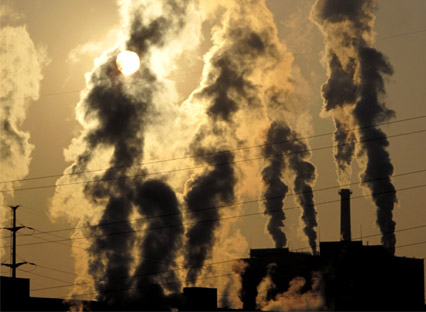Most fossil fuels 'unusable' under climate change goals
New research means much of the reserves held by major oil and gas companies could become worthless

A free daily email with the biggest news stories of the day – and the best features from TheWeek.com
You are now subscribed
Your newsletter sign-up was successful
Global fossil fuel reserves worth trillions of dollars must be left largely untouched if international targets on curbing climate change are to be met, a new study has found.
Research conducted by University College London found that 80 per cent of coal, half of all gas and a third of all oil reserves cannot be used if the world is to keep the global rise in temperature under an internationally agreed 2C safety limit.
"Policy makers must realise that their instincts to completely use the fossil fuels within their countries are wholly incompatible with their commitment to the 2C goal," lead researcher Dr Christophe McGlade told the BBC.
The Week
Escape your echo chamber. Get the facts behind the news, plus analysis from multiple perspectives.

Sign up for The Week's Free Newsletters
From our morning news briefing to a weekly Good News Newsletter, get the best of The Week delivered directly to your inbox.
From our morning news briefing to a weekly Good News Newsletter, get the best of The Week delivered directly to your inbox.
Previous research has stated that burning the world's fossil fuel reserves would release three times the amount of carbon permitted by international agreements.
However, this is the first time scientists have said which fuels in which countries would have to be left unused.
The report found that:
- 82 per cent of global coal reserves cannot be burned, including 92 per cent in the US, 94 per cent in the former Soviet republics and 85 per cent in Africa
- almost half of all gas reserves must be left untouched, including all of the reserves in the Arctic as well as the majority in the Middle East, China and India
- a third of global oil reserves cannot be used, including all Arctic reserves, the majority in Canada and 38 percent in the Middle East.
Major oil and gas companies, including BP, Chevron and Anglo American now face the risk that "significant parts of their reserves will become worthless", The Guardian reports.
A free daily email with the biggest news stories of the day – and the best features from TheWeek.com
Rob Bailey, research director for energy, environment and resources at Chatham House said that the report would make uncomfortable reading for governments and private companies across the globe.
"The recently heralded golden age of gas will be short-lived if we are to avoid dangerous climate change," he warned.
-
 Local elections 2026: where are they and who is expected to win?
Local elections 2026: where are they and who is expected to win?The Explainer Labour is braced for heavy losses and U-turn on postponing some council elections hasn’t helped the party’s prospects
-
 6 of the world’s most accessible destinations
6 of the world’s most accessible destinationsThe Week Recommends Experience all of Berlin, Singapore and Sydney
-
 How the FCC’s ‘equal time’ rule works
How the FCC’s ‘equal time’ rule worksIn the Spotlight The law is at the heart of the Colbert-CBS conflict
-
 The plan to wall off the ‘Doomsday’ glacier
The plan to wall off the ‘Doomsday’ glacierUnder the Radar Massive barrier could ‘slow the rate of ice loss’ from Thwaites Glacier, whose total collapse would have devastating consequences
-
 Can the UK take any more rain?
Can the UK take any more rain?Today’s Big Question An Atlantic jet stream is ‘stuck’ over British skies, leading to ‘biblical’ downpours and more than 40 consecutive days of rain in some areas
-
 As temperatures rise, US incomes fall
As temperatures rise, US incomes fallUnder the radar Elevated temperatures are capable of affecting the entire economy
-
 The world is entering an ‘era of water bankruptcy’
The world is entering an ‘era of water bankruptcy’The explainer Water might soon be more valuable than gold
-
 Climate change could lead to a reptile ‘sexpocalypse’
Climate change could lead to a reptile ‘sexpocalypse’Under the radar The gender gap has hit the animal kingdom
-
 The former largest iceberg is turning blue. It’s a bad sign.
The former largest iceberg is turning blue. It’s a bad sign.Under the radar It is quickly melting away
-
 How drones detected a deadly threat to Arctic whales
How drones detected a deadly threat to Arctic whalesUnder the radar Monitoring the sea in the air
-
 ‘Jumping genes’: how polar bears are rewiring their DNA to survive the warming Arctic
‘Jumping genes’: how polar bears are rewiring their DNA to survive the warming ArcticUnder the radar The species is adapting to warmer temperatures